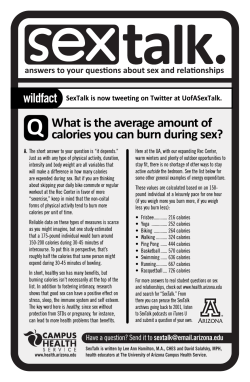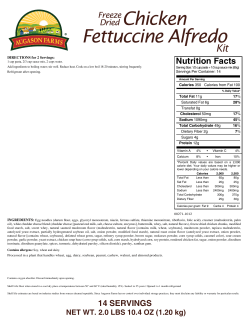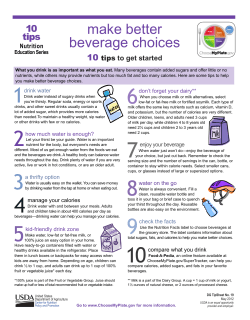
Do Diets Work?
Do Diets Work? Many Americans are looking for the magical diet or pill to lose fat and build muscle, and every year there’s a new weight loss solution or body building scheme to do it. With all the media hype about these new diets and products, it’s easy to forget the truth. Let’s return to the basics. Bottom Line: To maintain weight, you must maintain an energy balance! In other words, Calories In must equal Calories Out. “Calories In” includes what we eat and drink. “Calories Out” includes our basal metabolic rate (what we burn to maintain our physiological functions at complete rest), normal daily activities, and purposeful exercise. The only way to lose weight is to create a calorie deficit, more calories out than calories in. One pound of fat equals 3500 calories. To lose a pound a week, that means creating a deficit of 500 calories per day (either by eating fewer calories or burning more in physical activity). To gain a pound a week, that means creating an excess of 500 calories per day. Whether or not those extra calories go towards building muscle or fat depends on whether or not you exercise. Fad diets work (in the short term) because they cut calories. It makes no difference if it’s a 40-30-30 plan, a very low carbohydrate diet plan, or a food-combining plan. All of these plans are low in calories. Problems with Restrictive Dieting When you restrict calories too much in an effort to lose weight very quickly, the following may happen and can be detrimental to your weight, health, academic success, and social life: ● Your metabolism slows down in order to adapt to the lower caloric intake (so it can function with less fuel). And, it actually begins to be more efficient at holding on to the calories you eat and storing them as fat (since it’s not sure you will feed it later). This is why people who diet, usually gain back their weight (and more!) once they start eating normally again. Updated 5.2010 ● You lose mostly water and muscle, not fat. Without enough calories and protein from food, your body starts breaking down its own muscle protein for fuel. When you lose muscle, your metabolism slows down even more! ● You have poor concentration and low energy. After all, your brain, muscles, and other vital organs are deprived of fuel. ● You get in a terrible mood. Starvation often results in increased depression and irritability. ● You develop a food preoccupation. Your body is starving so your thoughts become consumed with food. ● You develop an increased risk for binge eating. Your body wants to hoard as much food as possible in case it’s forced to starve again. ● You usually gain your weight back rapidly in the form of fat. So, to maximize fat loss (and minimize the drop in your metabolism, energy, mood, and grades), take it slow! Decrease your intake slightly by 300-500 Calories per day and increase your exercise output. Aim for about 0.5-2 lb. weight loss per week. If you are extremely overweight, 2 lb. per week is acceptable. The Truth About Low Carb Diets Like all low calorie diets, low carbohydrate plans often result in weight loss. If you exclude carbohydrate-rich foods, you’re eliminating a lot of calories, you get bored with the allowed protein and fat choices, so you end up eating less. Protein and fat also make you feel fuller, so you’re not as hungry and don’t eat as much. The more moderate carbohydrate plans (like the Zone, 40% carbohydrates) are more harmless and even have some positive attributes. Others that are very restrictive in carbohydrates (like the Atkins diet) can have many negative effects: ● Dehydration: Carbohydrate’s are stored with water as glycogen in our muscles and liver. When you don’t eat carbohydrates, your glycogen stores become depleted and you lose water. NOTE: That’s why you lose several pounds in the first couple of days. You are losing water weight. In addition, these diets create more metabolic waste (from Updated 5.2010 protein and fat metabolism) which must be excreted with water in your urine, causing dehydration. ● Constipation: These diets tend to be very low in fiber (since fiber is found in carbohydrate- rich foods). Fiber not only helps maintain bowel regularity, but it also helps lower blood cholesterol levels and reduces your risk for hemorroids. ● Heart Disease/Cancer: These diets tend to be high in saturated animal fat, which has been associated with high LDL, or “bad”, cholesterol levels, heart disease, and certain forms of cancer (like prostate and colon cancers). These diets also tend to be low in the protective, disease-fighting phytonutrients found in whole grains and fruits. ● Bone Disease: These diets tend to be low in calcium (since dairy foods are high in carbohydrate and, therefore, often restricted). Worse yet, excessive protein intake causes greater calcium excretion in your urine, meaning your body has less calcium in it. ● Low Energy, Poor Work-Outs: Carbohydrate stores in our muscles are what fuel high intensity work-outs (like weight training). You can’t use fat or protein for fuel at high intensities. If your muscles are carb-depleted, you won’t have as much energy to lift as much weight. As a result, you won’t build as much muscle. In addition, carbohydrate stores are critical for maintaining endurance during vigorous aerobic training. If your muscles are carb-depleted, you’ll fatigue sooner; and as a result, you won’t be able to burn as many Calories or as much body fat. ● Bad breath: When carbohydrate is lacking, fats are broken down to ketones, which give an acetone (nail polish remover) smell to your breath. High amounts of ketones also disrupt the acid-base and electrolyte balance in your blood, which can lead to more serious problems, including death. Low carbohydrate diets (like all fad diets) are something most people “go on” and then “go off.” When you “go off,” the weight comes back and you create a cycle of yo-yo dieting which wears heavy on your body and mind. For permanent success, you need to make small, sustainable, healthy changes in your eating and activity patterns! Forming healthy habits that you will adopt for a lifetime is the key to successful weight loss! Updated 5.2010
© Copyright 2025





















